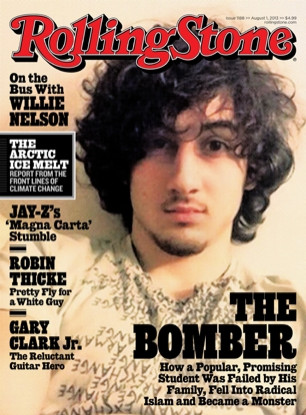Rolling Stone Cover Sparks #BoycottRollingStone After Alleged Boston Bomber Dzhokhar Tsarnaev Is Featured

[UPDATE 2:55 P.M.] Rolling Stone has released an official statement in response to much of the backlash it has received from its latest cover story in which Boston Marathon bombing suspect Dzhokhar Tsarnaev is featured on the front of the magazine.
Our hearts go out to the victims of the Boston Marathon bombing, and our thoughts are always with them and their families. The cover story we are publishing this week falls within the traditions of journalism and Rolling Stone’s long-standing commitment to serious and thoughtful coverage of the most important political and cultural issues of our day. The fact that Dzhokhar Tsarnaev is young, and in the same age group as many of our readers, makes it all the more important for us to examine the complexities of this issue and gain a more complete understanding of how a tragedy like this happens. –THE EDITORS
While Rolling Stone magazine has always been known to embody what is popular in music, media and culture, the cover of the legendary publication has a life of its own. To get the cover of Rolling Stone is one of the greatest honors in music publishing. It goes without saying that if you're featured under those two journalistically iconic words, then you've made it.
The subject of the new issue's cover has provoked many critics to say that the magazine has gone too far, however. The issue, which hits newsstands Friday, features the infamous Boston Marathon bombing suspect Dzhokhar Tsarnaev. Seen with the bold black words “The Bomber,” the magazine promises to reveal "[h]ow a popular, promising student was failed by his family, fell into radical Islam, and became a monster."
A recent blog post on Rolling Stone’s website refers to its latest cover story, saying that readers can expect “a deeply reported account of the life and times” of the man who is accused of killing three people and injuring more than 250 others in the April 15 Boston Marathon bombing.
The blog details how contributing editor Janet Reitman spent the past two months interviewing dozens of sources – childhood and high school friends, teachers, neighbors and law enforcement agents -- in an effort “to deliver a riveting and heartbreaking account of how a charming kid with a bright future became a monster.”
Rolling Stone also offers several “revelations” about Tsarnaev that it says comes from Reitman’s reporting.
"Jahar never spoke about 9/11. Once, though, he let slip to a high school friend that he thought the terrorist attacks could be justified, and pointed to U.S. policies toward Muslim countries and US drone strikes and other attacks as his rationale."
"Jahar shared few details of his troubled home life with even his closest friends. In the months leading up to the bombing, his family had disintegrated. His parents were both living in Russia. His two older sisters were estranged. Only Tamerlan, who was becoming increasingly devout and judgmental of all non-Muslims, was still in Boston. When one of Jahar’s friends asked to meet Tamerlan, Jahar said, 'No, you don't want to meet him.'"
Meanwhile, the controversial cover is quickly drawing negative reactions on social media, with "Boycott Rolling Stone" becoming a trending Twitter topic.
I've loved Rolling Stone for as long as I can remember, but now I say# boycott Rolling Stone!!!!
— Barbara Montero (@Jovigirl4always) July 17, 2013
The cover of rolling stone is supposed to be an honor ... @RollingStone just lost alot of credit with that move #scumbags
— Johnny Welz (@jdubs220) July 17, 2013
Absolutely disgusted with @RollingStone and their August issue. How could you put the bomber's face on the cover?! #insensitive #mediacircus
— Paige (@psojka2029) July 17, 2013
Federal authorities allege that the Tsarnaev brothers planted the two bombs that exploded near the finish line of the Boston Marathon April 15.
Four days later, Dzhokhar Tsarnaev, who survived a shootout with police in which Tamerlan was killed, was captured following a daylong manhunt in the Boston suburb of Watertown.
On July 10, Tsarnaev pleaded not guilty to 30 counts of a federal indictment. If the government decides to seek capital punishment, Tsarnaev could face the death penalty if convicted on one of 17 counts.
© Copyright IBTimes 2024. All rights reserved.






















